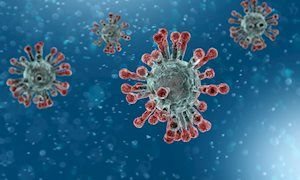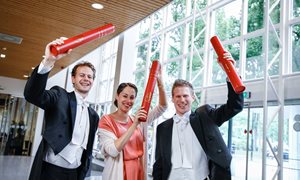10 April 2020
Exposure to high catecholamine levels is associated with inflammatory changes of myeloid cells and atherosclerosis, but the underlying mechanisms are only partly understood. To investigate whether the pro-inflammatory effects of noradrenaline and adrenaline can in part be explained by the induction of an immunological memory in innate immune cells, termed 'trained immunity'.
In vitro, they exposed human primary monocytes to (nor)adrenaline for 24 hours, after which cells were rested and differentiated to macrophages over 5 days. After restimulation with LPS on day 6, (nor)adrenaline-exposed cells showed increased TNF-α production. This coincided with an increase in glycolysis and oxidative phosphorylation measured with Seahorse technology on day 6 before restimulation. Inhibition of the β-adrenoreceptor-cAMP signaling pathway prevented the induction of training. In vivo, they studied the functional, transcriptional, and epigenetic impact of peak-wise exposure to high catecholamine levels on monocytes isolated from pheochromocytoma/paraganglioma (PHEO) patients. In PHEO patients (n=10), the peripheral blood cell composition showed a myeloid bias and an increase of the inflammatory CD14+CD16++ intermediate monocyte subset compared to controls with essential hypertension (n=14). Ex vivo production of pro-inflammatory cytokines was higher in PHEO patients. These inflammatory changes persisted for 4 weeks after surgical removal of PHEO. Transcriptome analysis of circulating monocytes at baseline showed various differentially expressed genes in inflammatory pathways in PHEO patients; epigenetic profiling of the promoters of these genes suggestsenrichment of the transcriptionally-permissive chromatin mark H3K4me3, indicative of in vivo training.
Catecholamines induce long-lasting pro-inflammatory changes in monocytes in vitro and in vivo, indicating trained immunity. Their data contribute to the understanding of pathways driving inflammatory changes in conditions characterized by high catecholamine levels, and propose that trained immunity underlies the increased cardiovascular event rate in PHEO patients.

Exposure to high catecholamine levels is associated with inflammatory changes of myeloid cells and atherosclerosis, but the underlying mechanisms are only partly understood. To investigate whether the pro-inflammatory effects of noradrenaline and adrenaline can in part be explained by the induction of an immunological memory in innate immune cells, termed 'trained immunity'.
In vitro, they exposed human primary monocytes to (nor)adrenaline for 24 hours, after which cells were rested and differentiated to macrophages over 5 days. After restimulation with LPS on day 6, (nor)adrenaline-exposed cells showed increased TNF-α production. This coincided with an increase in glycolysis and oxidative phosphorylation measured with Seahorse technology on day 6 before restimulation. Inhibition of the β-adrenoreceptor-cAMP signaling pathway prevented the induction of training. In vivo, they studied the functional, transcriptional, and epigenetic impact of peak-wise exposure to high catecholamine levels on monocytes isolated from pheochromocytoma/paraganglioma (PHEO) patients. In PHEO patients (n=10), the peripheral blood cell composition showed a myeloid bias and an increase of the inflammatory CD14+CD16++ intermediate monocyte subset compared to controls with essential hypertension (n=14). Ex vivo production of pro-inflammatory cytokines was higher in PHEO patients. These inflammatory changes persisted for 4 weeks after surgical removal of PHEO. Transcriptome analysis of circulating monocytes at baseline showed various differentially expressed genes in inflammatory pathways in PHEO patients; epigenetic profiling of the promoters of these genes suggestsenrichment of the transcriptionally-permissive chromatin mark H3K4me3, indicative of in vivo training.
Catecholamines induce long-lasting pro-inflammatory changes in monocytes in vitro and in vivo, indicating trained immunity. Their data contribute to the understanding of pathways driving inflammatory changes in conditions characterized by high catecholamine levels, and propose that trained immunity underlies the increased cardiovascular event rate in PHEO patients.
Related news items

COVID-19 associated coagulopathy - lessons after 1 year
17 May 2021 Jenneke Leentjens, Saskia Middeldorp, and colleagues, published a review on the current knowledge of COVID-19 associated coagulopathy and the role of antithrombotic therapies in the Lancet Haematology. go to page
Set7 regulates enhanced cytokine production in trained immunity in vitro
28 April 2020 Postdoc Sam Keating and colleagues from the group of Niels Riksen, theme Vascular damage, revealed Set7 as a key regulator of trained immunity. They have published their findings in Cell Reports. go to page
Dutch National Postdoc award for Siroon Bekkering
29 November 2019 Siroon Bekkering, theme Vascular damage, will use the prize money (€10,000) for her follow-up research into the memory of the innate immune system of patients with cardiovascular diseases. go to page
RIMLS PhD grants awarded to eight RIMLS (j)PI's
12 September 2019 Recently, RIMLS held an internal call for Radboudumc junior researcher (PhD) positions. Congratulations for all the awardees and all the best in conducting the research projects. go to page
